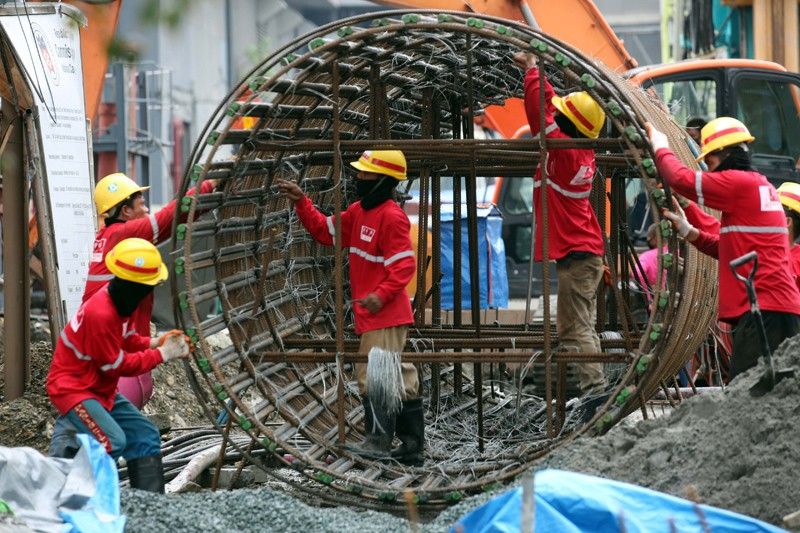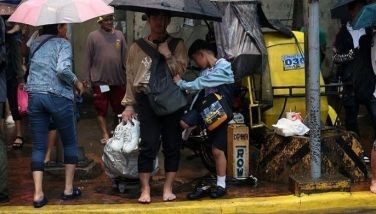DOLE eyes deferment of 13th month pay

MANILA, Philippines — Some workers may not be able to receive the mandated 13th month pay this coming holiday season, according to the Department of Labor and Employment.
DOLE Secretary Silvestre Bello III yesterday said the agency is looking into the possibility of allowing employers to defer the granting of 13th month pay.
Delayed payment is a better option for workers than just exempting distressed commercial establishments from paying the mandated financial benefit, Bello said.
“Instead of not paying, why don’t we just consult labor and management so they could agree on deferment, let’s say give the benefit next year or next month,” he said.
“For me, this is a more acceptable formula in addressing the issue of non-payment of the mandated benefit,” he added.
Under the law, commercial establishments classified as distressed are exempted from providing their workers with 13th month pay.
Bello said the meaning of “distressed establishment” is broad and needs to be redefined.
Bello expressed belief that micro and small medium enterprises must be exempted from paying 13th month, but not companies with capitalization of above P1 million.
“We are still studying this and it would be a subject of thorough discussion by both the management and employees,” Bello added.
Also yesterday, Bello reported that DOLE is likely to extend for another three months the requirement for companies to rehire workers they have temporarily terminated because of the pandemic.
He said companies are mandated to rehire temporarily terminated workers after six months, but the employers’ groups requested that it be extended for another six months.
Extending the period of rehiring is meant to preserve jobs, but Bello said three months is a sufficient time for companies to comply with the law.
Burnout
Heavy workload and low compensation during the COVID-19 pandemic are causing burnout and possible mental disorders in workers, mental health advocates warned yesterday.
RJ Naguit, chairman of the Youth for Mental Health Coalition Inc., said heavy workload and low compensation are among the identified “determinants” of stress and burnout in the workplace.
“Employees who don’t have control over their work, with heavy workload and lack of perks or are not compensated properly can likely suffer from burnout,” Naguit said in virtual forum yesterday.
The lack of psychological support from their superiors, unequal distribution of workload and the need to comply with deadlines may also affect workers’ mental health, Naguit said.
“It’s not about financial reward all the time. Sometimes telling an employee that he or she did a good job can help lessen the risk of burnout,” Naguit said.
With the reopening of the economy and commercial establishments comes the need to address the mental health concerns of workers.
“The pandemic gives us the realization that we should look at workers not just as a capital. We must humanize the workplaces,” Naguit said.
Occupational Medicine specialist Gia Sison said the sense of belongingness could help address the growing mental health problem in the workplace, particularly in this time of uncertainty.
“Involving workers in decision making shows how a company treats the worker. At this time of uncertainty, the feeling of belongingness in one organization really matters,” Sison said.
“We need more empathy for both workers and employers. It needs to be a two-way relationship to develop a healthier workplace,” she added.
Naguit said mental health condition at the early onset of symptoms must be addressed to prevent it from becoming severe.
“Don’t wait for the illness to become severe, our actions must be preventive,” he said.
As a result of the pandemic, Sison said, there is now a growing demand for mental health services among Filipinos, including workers.
“We have to make mental services accessible, cost effective and sustainable,” Sison said, adding that the high cost of medical consultation is one of the reasons why people with mental health condition are unable to seek treatment.
Both Naguit and Sison agreed that the government should pour in more funds for mental health programs, with mental disorder projected to be the next pandemic after COVID.
Labor Undersecretary Benjo Benavidez said the Mental Health Law upholds the right of all Filipinos, including workers to mental health services.
The same law requires the DOLE to implement appropriate mental health programs in the workplace.
Despite the policies issued by DOLE, Benavidez admitted there is much to be done in promoting mental health in the workplace.
“Many companies are still groping on how to implement a mental health program,” he said.
- Latest
- Trending





























